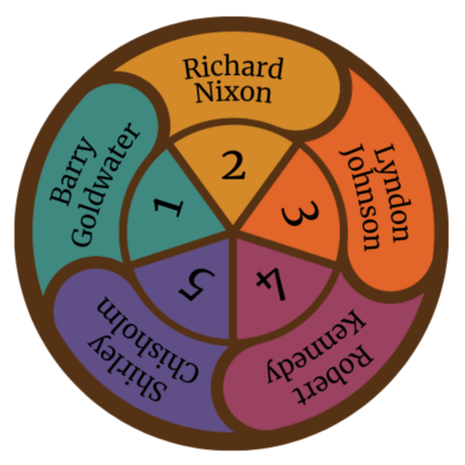Barry GoldwaterIn 1952, Berry Goldwater of Arizona was elected to the Senate on a pledge to reduce federal spending and fight communism. Reelected in 1958, Goldwater opposed social welfare programs and continued to criticize the Supreme Court on its school integration stance. He even voted against the Civil Rights Act of 1964. Considered to be one of the founders of the modern conservative movement, he ran for president in 1964 but was defeated by Lyndon B. Johnson. In 1974, he led the delegation that persuaded Richard Nixon to resign as president.
|
Richard NixonRichard Nixon served two terms as Vice President under Republican Dwight Eisenhower. In 1960, he lost the presidential election to John F. Kennedy. He left politics to practice law and over the next few years built a reputation as an expert in foreign affairs. Finally in 1968, he joined the run for president on a platform promising an honorable peace in Vietnam, the restoration of law and order in the cities, a crackdown on illegal drugs, and an end to the draft. A few years later, faced with almost certain impeachment for his role in the Watergate scandal, he became the first American president to resign from office.
|
Lyndon JohnsonAfter the assassination of John F. Kennedy, Lyndon B. Johnson declared that he would make the United States into a “Great Society” in which poverty and racial injustice had no place. He developed a set of programs that would give poor people “a hand up, not a handout.” These included Medicare and Medicaid, which helped elderly and low-income people pay for health care; Head Start, which prepared young children for school; and a Job Corps that trained unskilled workers providing them with the academic and vocational skills they needed to secure employment.
|
Robert KennedyRobert Kennedy was the U.S. Attorney General and adviser during the administration of his brother President John F. Kennedy. He presided over the Department of Justice and fought organized crime. He was increasingly committed to the rights of African Americans to vote, receive an equal education, and use public accommodations, and he was instrumental in sending federal marshals and supporters to help Martin Luther King, Jr. in Montgomery, Alabama. After the assassination of JFK, Robert became a U.S. senator. He was assassinated while campaigning for the Democratic Party’s presidential nomination in 1968.
|
Shirley ChisholmShirley Chisholm was a specialist in early education, and in 1968, she ran for U.S. Congress becoming the first African American woman to be elected. Chisholm opposed the Vietnam War, and in her first speech in Congress, she promised to vote against any more spending on defense. Aiming higher still, in 1972 Chisholm decided to run for president of the United States. She was the first African American to run as a candidate for the presidency in a major political party, and she was the first woman to run for president as a Democrat. Ultimately, the democrats chose George McGovern as their candidate. McGovern later lost the presidential election to republican Richard Nixon.
|
Read the passages. Solve the puzzle to see the "Who was..." statements. Identify the political figure involved in the action, and use the corresponding number on the wheel for your lock code. The numbers should reflect the order of the actions listed in the puzzle.

